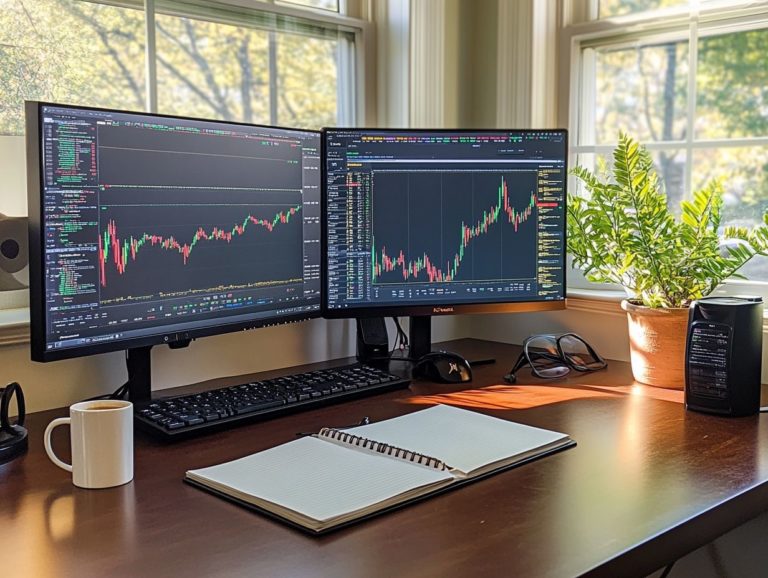The Psychological Effects of Trading Frequency
In the fast-paced world of trading, frequency often overshadows the essential elements of strategy and mental well-being. As you chase quick profits, it’s easy to overlook the emotional toll that constant trading takes on you.
This exploration delves into the psychological impacts of frequent trading, highlighting the emotional strain and mental exhaustion it can induce. It also discusses the advantages of reducing your trading frequency, offering strategies to prioritize your mental health while sharpening your decision-making skills for lasting success.
Contents
- Key Takeaways:
- The Psychological Impact of Frequent Trading
- Why You Should Cut Back on Trading
- Strategies for Reducing Trading Frequency
- Frequently Asked Questions
- What is trading frequency?
- How does trading frequency affect a trader’s psychology?
- What are some potential psychological effects of high trading frequency?
- Are there any benefits to a high trading frequency?
- Can low trading frequency also have psychological effects?
- How can traders manage the psychological effects of trading frequency?
Key Takeaways:

- Frequent trading negatively impacts mental and emotional well-being, causing stress and exhaustion.
- Reducing trading frequency helps lower stress and improves decision making, enhancing overall trading performance.
- Strategies like setting realistic goals, using automation, and prioritizing mental health can help traders minimize their trading frequency and achieve long-term success.
The Psychological Impact of Frequent Trading
Frequent trading can greatly affect your psychological well-being, intensifying emotional responses driven by fear and greed. You might feel the pressure of performance anxiety as the market changes, making it hard to make sound decisions.
When emotions take control, influenced by market sentiment and how we think about risks, your trading discipline may slip, and effective risk management can escape you. This can lead to impulsive decisions and costly trading mistakes that could have been avoided with a more measured approach.
Emotional Toll
The emotional toll of trading can weigh heavily on you. Conflicting forces of fear and greed shape your reactions to market fluctuations, often leading to significant stress.
These emotions create a wild ride of highs and lows, sometimes resulting in rash decisions that stray from your carefully crafted strategies. Fear might make you exit trades too soon, missing out on potential profits, while greed could lure you into holding winning positions longer than advisable, risking everything for uncertain gains.
Performance anxiety can loom large, making it hard to maintain clarity in your decision-making. This pressure may cloud your judgment, leading to erratic behaviors that impede your trading success, underscoring the need for emotional regulation as you navigate the complexities of the financial markets.
Mental Exhaustion
Mental exhaustion is a common result of frequent trading, as you face a barrage of emotional challenges that test your psychological strength and decision-making skills. The relentless nature of the markets, coupled with the pressure to make quick, high-stakes decisions, can lead to cognitive overload.
As you navigate the ever-changing tides of market sentiment and wrestle with your own biases such as overconfidence or the fear of loss your emotional state may become increasingly fragile. This mental fatigue can cloud your judgment, pushing you toward hasty decisions that jeopardize your trading performance.
Failing to recognize this exhaustion can trap you in a vicious cycle, where poor mental health hampers your ability to concentrate and effectively analyze market conditions. The emotional toll doesn’t stop at the trading desk; it can spill over into your personal relationships and overall well-being.
Why You Should Cut Back on Trading

Cutting back on your trading frequency can unlock numerous benefits, such as enhanced emotional management and refined decision-making in the dynamic world of financial markets.
By stepping back from impulsive trading behaviors, you have the chance to cultivate greater discipline and focus on developing strong investment strategies that consider the psychological factors affecting your performance.
Benefits of Reducing Trading Frequency:
- Improved emotional control
- Better decision-making
- Enhanced focus on long-term strategies
Take these insights into account and consider applying these strategies to improve your trading practices today!
Reduced Stress and Anxiety
One of the most significant advantages of reducing your trading frequency lies in reducing stress and anxiety that often accompany the relentless pressures of market dynamics.
By allowing yourself more time between trades, you can gain a clearer perspective on market trends, free from the emotional turmoil that relentless activity breeds. This approach helps you stay disciplined emotionally, giving you the power to think critically rather than react impulsively to market fluctuations.
As a result, your decisions are made with a level head, leading to improved trading outcomes. Embracing a more mindful trading approach opens the door to rational assessments, ultimately enhancing your likelihood of success on your trading journey!
Better Decision Making
By minimizing the frequency of your trades, you can significantly enhance your decision-making processes, allowing for deeper analysis and a heightened awareness of the thinking errors that may impact your trading performance.
This reduction in trading activity creates a chance for reflection and critical thinking, enabling you to scrutinize your strategies without the pressure of immediate action. Emotional influences like fear and greed can often cloud your judgment, leading to impulsive decisions that stray from a well-thought-out trading plan.
By taking a step back and reducing the noise created by constant market fluctuations, you can better recognize and combat these emotional triggers. This disciplined approach fosters greater clarity and ultimately leads to more informed, rational choices that can enhance your overall trading success.
Strategies for Reducing Trading Frequency
By implementing effective strategies to reduce your trading frequency, you can achieve improved trading outcomes, enhance your psychological well-being, and create a more structured trading plan that aligns with your individual goals and preferences!
Setting Realistic Goals

Setting realistic goals is essential for reducing your trading frequency, as it gives you the power to maintain emotional discipline and cultivate better trading habits.
By establishing achievable objectives, you can redirect your focus away from impulsive trades fueled by emotions and towards a more measured strategy. This balance results in fewer transactions and enhances your outcomes, helping you sidestep the pitfalls of overtrading.
With a clearer sense of purpose, you’re more likely to adhere to your strategies and resist the temptations posed by market fluctuations. This disciplined approach fosters a sustainable trading plan, facilitating long-term growth while alleviating the cognitive strain that comes with constant decision-making.
Utilizing Automation
Utilizing automated trading systems can dramatically enhance your trading experience! This streamlining allows you to execute strategies that align with current market trends while effectively managing risk.
By automating your trades, you can eliminate the emotional biases that often cloud judgment think fear and greed. This emotional detachment is essential, enabling you to adhere to your established plans without second-guessing your decisions based on fleeting market movements.
Automated trading can swiftly analyze vast amounts of data, helping you pinpoint profitable opportunities that might slip past human traders. This not only boosts your efficiency but also fosters greater consistency in performance, giving you the power to capitalize on market trends with precision and significantly less stress over time!
Prioritizing Mental Health and Long-Term Success
Prioritizing your mental health is crucial for achieving long-term success in trading. It equips you to navigate the emotional challenges that arise while maintaining the discipline needed for effective trading strategies.
A strong mental state enables you to make rational decisions, even when the market experiences volatility or when unexpected losses occur.
By fostering resilience and emotional stability, you can better manage stress and steer clear of impulsive reactions that often lead to poor choices.
Understanding the mental aspects of trading gives you the power to develop coping mechanisms, sharpen your focus, and remain committed to your trading plans. This cultivates a more consistent performance, effectively minimizing the risks associated with anxiety and fear common hurdles in the trading landscape.
Emotional Challenges of Trading
Trading is an emotional minefield, where the delicate dance between fear and greed often leads to irrational choices and costly blunders, a reality underscored by the principles of behavioral finance.
Even experienced traders face these emotional challenges. The fear of missing out on a potential profit might spur you into impulsive purchases, while the anxiety over losses can push you to sell prematurely.
This psychological tug-of-war creates a repeating cycle of erratic behavior, as you find yourself constantly wrestling with your instincts. The pressure to succeed only magnifies these feelings, making it increasingly challenging to maintain a disciplined approach.
To achieve consistent success in trading, you must recognize and manage your emotional responses.
Frequently Asked Questions

What is trading frequency?
Trading frequency refers to how often trades happen over a set period of time, such as in a day, week, or month. It can range from a few trades per day to just a few trades per year.
How does trading frequency affect a trader’s psychology?
Trading frequency can have a significant impact on a trader’s psychology. A high frequency of trades can lead to increased stress and emotional reactions, while a low frequency can lead to feelings of boredom or anxiety about missing out on potential opportunities. Understanding the psychological impact of trading frequencies is crucial for managing these effects.
What are some potential psychological effects of high trading frequency?
High trading frequency brings a rush, but it can also create stress and anxiety. It can result in impulsive decision-making and emotional reactions to market fluctuations.
Are there any benefits to a high trading frequency?
While high trading frequency can have negative psychological effects, it can also provide a sense of control and satisfaction for some traders. If executed effectively, it can potentially lead to higher profits.
Can low trading frequency also have psychological effects?
Yes, low trading frequency can also have psychological effects on a trader. It can lead to feelings of boredom, anxiety about missing out on potential opportunities, and a lack of control over one’s investments. Understanding the psychology of trading strategies could help mitigate these issues and prevent impulsive or emotional trading when a trade is finally made.
How can traders manage the psychological effects of trading frequency?
Traders should regularly assess the impact of their trading frequency on their mental well-being and adjust accordingly. Techniques include setting clear goals, sticking to a trading plan, practicing mindfulness, and taking breaks from constant market monitoring.
Remember, your mental health is key to your trading success. Take care of it!






